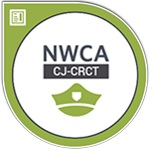PURPOSE
The Corrections credential documents the essential competencies for professionals involved in the U.S corrections system including correctional officers and jailers, probation and parole officers, police officers and detectives, correctional treatment specialists, and social workers.
AUDIENCE
This credential is appropriate for a variety of professionals involved in the U.S. correctional system and with offenders and victims of crimes. These professionals include correctional officers and jailers, police and detectives, crime investigators, social services and human service professionals and assistants, substance abuse and behavioral disorder counselors, court personnel, and probation and parole professionals including those who work with juveniles.
JOB/CAREER REQUIREMENTS
These credentials document competencies including applying an understanding of the U.S. corrections and juvenile corrections system to daily tasks, applying an understanding of the common characteristics of adult and juvenile offenders, and handling the needs and challenges associated with special offenders such as drug offenders, those who are mentally ill, violent inmates, older inmates, sex offenders, and those who are ill in a correctional situation. These professionals must also understand the types of sentencing and sanctions that can be applied for specific crimes. Further, corrections professionals must understand the organization, characteristics, management, personnel, and daily life and activities in the U.S. corrections systems at all levels. They must also understand the unique activities associated with probation, parole, and intermediate sanctions that may be ordered for offenders. Finally, corrections professionals must understand the numerous challenges and problems associated with correctional facilities.
CORRECTIONS WORKPLACE TASKS:
- Correctional officers apply an understanding of the correctional system as they oversee individuals who have been arrested and are awaiting trial or who have been sentenced to serve time in jail or prison
- Correctional facility staff must understand the correctional system and characteristics of various types of inmates as they enforce rules, keep order, supervise activities, aid in rehabilitation, provide counseling services, inspect facilities to meet standards, search inmates, and perform reporting requirements
- Correctional treatment specialists, case managers, or correctional counselors must understand the correctional system as they advise offenders, develop rehabilitation plans for those who are released from the system, and work with parole and probation personnel
- Correctional staff review reports of inmates and make recommendations and provide information to parole boards, mental health professionals, job placement specialists, probation officers, and parole officers
- Police offers apply an understanding of the correctional system as they perform their duties in the protection of lives and property
- Social and human service professionals support offenders as they are processed through the criminal justice system and assist them in finding needed community services
- Counselors, therapists, psychologists, and psychiatrists who work with inmates and those who are serving sentences for their crimes must understand the correctional system in order to advise them appropriately and support them in developing coping skills or solving related problems
- Substance abuse and behavioral counselors must understand the corrections system as they assist individuals in recovering from the effects of alcoholism, drug addiction, and other behavioral problems as they serve out their sentences or prepare to return to the community after serving their sentences
- Probation officers must understand the correctional systems and sanction options as they evaluate offenders to determine the best course of rehabilitation, provide offenders resources, test offenders for drugs and other substances, monitor offenders and help them with their progress, conduct meetings with offenders and their families, and report on offender progress
- Parole officers must understand the correctional system and sanction options as they work with those who have been release from jail and are serving parole, assist released prisoners in returning to the community, provide offenders with resources, and refer offenders to appropriate therapy or counseling
- Pretrial services officers investigate an offender’s background to determine if an offender can be safely allowed back into the community before the trial date and make recommendations to the judge accordingly
EXAM STRUCTURE OVERVIEW
Number of Questions in Exam: 160
Total Time: 120 minutes
Overall Passing Score: 70%
(All sections require an individual passing score of 70%)

